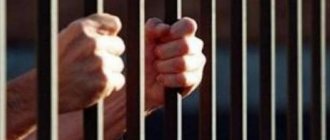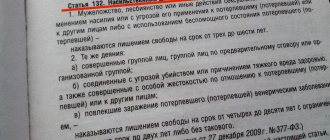1. Threat of murder, harm to health, destruction or damage to property against a judge, juror or other person participating in the administration of justice, as well as their relatives in connection with the consideration of cases or materials in court -
shall be punishable by a fine in the amount of one hundred thousand to three hundred thousand rubles, or in the amount of the wages or other income of the convicted person for a period of one to two years, or by imprisonment for a term of up to three years.
2. The same act committed against a prosecutor, investigator, person conducting an inquiry, defense lawyer, expert, specialist, employee of the enforcement authorities of the Russian Federation, as well as their relatives in connection with the conduct of a preliminary investigation, consideration of cases or materials in court or execution sentence, court decision or other judicial act, -
shall be punishable by a fine in the amount of up to two hundred thousand rubles, or in the amount of the wages or other income of the convicted person for a period of up to eighteen months, or by forced labor for a term of up to two years, or by arrest for a term of three to six months, or by imprisonment for a term of up to two years. .
3. Acts provided for in parts one or two of this article, committed with the use of violence not dangerous to life or health, -
shall be punished by forced labor for a term of up to five years or imprisonment for the same term.
4. Acts provided for in parts one or two of this article, committed with the use of violence dangerous to life or health, -
shall be punishable by forced labor for a term of up to five years or imprisonment for a term of five to ten years.
- Article 295. Encroachment on the life of a person conducting justice or preliminary investigation
- Article 297. Contempt of court
Commentary to Art. 296 of the Criminal Code of the Russian Federation
The main object of the crime is the interests of justice, the normal functioning of courts of any instance, as well as investigative and inquiry bodies. An additional object is personal health, life safety conditions and property relations.
The social danger of the crime lies in the fact that those specified in Art. 296 of the Criminal Code of the Russian Federation, actions disrupt the normal official activities of persons administering justice or conducting a preliminary investigation, creating an atmosphere of uncertainty about their own safety and the safety of their loved ones, the safety of property, which ultimately can lead to the adoption of an unjust decision.
Article 296 of the Criminal Code of the Russian Federation provides for criminal legal protection from threats of murder, harm to health, destruction or damage to property in relation to a judge, juror or other person involved in the administration of justice (Part 1), prosecutor, investigator, person conducting the inquiry, defender, expert, specialist, bailiff, bailiff, as well as their relatives (Part 2) in connection with the consideration of cases or materials in court.
The concept of “victims” is similar to those considered in relation to Art. 295 of the Criminal Code of the Russian Federation.
The objective side of the crime is expressed in alternative actions: the threat of committing certain actions or violent actions.
In relation to Art. 296 of the Criminal Code of the Russian Federation, a threat is an informational impact on the psyche of the persons specified in the article in question. The content of the threat is the externally expressed intention to perform the actions listed in the disposition of the norm, if they do not change the direction of their activities and do not obey the demands of the person expressing the threat. Through this influence, the victim is forced to refuse to make legal decisions on the case under consideration, is forced to neglect his procedural duties in the interests of the threat or another person, and to become an executor of the will of the guilty person.
Unlike Art. 119 “Threat of murder or infliction of grievous harm to health” of the Criminal Code of the Russian Federation in this article, the legislator did not specify the severity of possible harm to health. This may be a threat of causing minor, moderate or serious harm to health. It should be noted that the legislator in Art. 296 of the Criminal Code of the Russian Federation did not indicate the sign of “real threat”, whereas in Art. 119 of the Criminal Code of the Russian Federation especially emphasizes “if there were grounds to fear that this threat would be carried out.” It seems that this was done by the legislator because of the importance of the object of criminal protection - the normal activities of the court and other law enforcement agencies to ensure the goals and objectives of justice in accordance with the law. Responsibility is provided regardless of the reality of the threat. The degree of reality of the threat does not affect qualifications, but is taken into account when assigning punishment.
The destruction of property that is threatened by the victims involves rendering it either completely unsuitable for further use for its intended purpose, or in a state where its restoration is possible, but not economically feasible; damage - rendering property partially unusable, reducing its weight.
Threat of committing other actions not specified in the disposition of Art. 296 of the Criminal Code of the Russian Federation, does not form part of the crime in question. If certain conditions are met, it can be assessed as incitement to make a deliberately unjust sentence, decision or other judicial act (Articles 33, 305 of the Criminal Code of the Russian Federation).
Threat is punishable under Art. 296 of the Criminal Code of the Russian Federation, if it occurs in connection with the consideration of cases or materials in court or with the conduct of a preliminary investigation, or with the execution of a sentence, court decision or other judicial act. Threat of murder, infliction of grievous bodily harm in relation to those specified in Art. 296 of the Criminal Code of the Russian Federation of persons for personal reasons, not related to the activities of the administration of justice, if it is real, should be qualified under Art. 119 of the Criminal Code of the Russian Federation.
The qualifying criteria include the use of violence that is not dangerous to life or health (Part 3), as well as violence that is dangerous to life or health (Part 4).
In Part 3 of Art. 296 of the Criminal Code of the Russian Federation, a threat committed with the use of violence not dangerous to the life and health of the victim is indicated as a qualifying circumstance. The characteristics of this type of violence are given in paragraph 21 of the Resolution of the Plenum of the Supreme Court of the Russian Federation of December 27, 2002 No. 29 “On judicial practice in cases of theft, robbery and robbery.” Violence that is not dangerous to life or health should be understood as beatings or other violent acts involving the infliction of physical pain on the victim or the restriction of his freedom (tying his hands, using handcuffs, leaving him in a closed room, etc.).
———————————
Bulletin of the Supreme Court of the Russian Federation. 2003. N 2.
In Part 4 of Art. 296 of the Criminal Code of the Russian Federation talks about violence dangerous to life and health. In accordance with the explanations of the specified paragraph 21 of the Resolution of the Plenum, it should be understood as such violence that resulted in the infliction of grave and moderate harm to the health of the victim, as well as the infliction of minor harm to health, causing a short-term health disorder or a minor permanent loss of general ability to work. This type also includes violence, although it did not cause harm to the health of the victim, but at the time of use it created a real danger to his life or health.
According to the construction of the objective side, the corpus delicti is formal. The crime is completed from the moment one of the actions specified in the disposition is committed: either uttering threats (parts 1 and 2), or using violence (parts 3 and 4), regardless of the impact on the preliminary investigation, consideration of cases or materials in court or for the execution of a sentence, decision or other judicial act.
In the norm under consideration, physical violence acts as a qualifying sign of committing a crime. In practice, the question arises about the extent of such violence.
We are talking about what volume of physical violence is covered without additional qualification by the corresponding element of a specific crime, and when additional qualification is required under articles on crimes against life, health and physical freedom.
In practice, the main way to solve this problem is to compare the severity of specific sanctions, since the nature of the social danger of the crime, the degree of importance of a particular object of criminal legal protection, including the danger of harm caused to it, are formally reflected in the sanction.
A complex violent crime is classified under one article (or part) in cases where the sanction for such a crime is more severe than the sanctions for the use of physical violence in the relevant articles of Chapter 16 of the Criminal Code of the Russian Federation.
———————————
Review of the judicial practice of the Supreme Court of the Russian Federation “Review of the quality of consideration by district (naval) military courts of criminal cases at first instance (clause 2.1 “Qualification of physical violence in complex violent crimes”)” (approved by the Resolution of the Presidium of the Supreme Court of the Russian Federation of January 26, 2005 ).
Taking into account the above, beatings, torture, causing minor, moderate and serious (Part 1 of Article 111 of the Criminal Code of the Russian Federation) harm to health are fully covered by Parts 3 and 4 of Art. 296 of the Criminal Code of the Russian Federation and do not require additional qualifications. Violence provided for in Parts 2, 3 and 4 of Art. 111 of the Criminal Code of the Russian Federation, must be qualified in conjunction with Part 4 of Art. 296 of the Criminal Code of the Russian Federation.
From the subjective side, the acts described by the dispositions of the norms of Art. 296 of the Criminal Code of the Russian Federation, are committed only with direct intent. The perpetrator is aware that he is threatening to kill, cause harm to health, destroy or damage property to a judge or other persons specified in the law, as well as their relatives in connection with the administration of justice or the conduct of a preliminary investigation, and wants the threat to influence the victim.
A mandatory feature of the subjective side of the crime is the motive of the perpetrator’s behavior. It must be related to the activities of the victim in connection with the administration of justice or the conduct of a preliminary investigation.
The general subject of the crime is a sane person who has reached the age of sixteen.
Judicial practice under Article 296 of the Criminal Code of the Russian Federation
Appeal ruling of the Appeal Board of the Supreme Court of the Russian Federation dated July 17, 2018 N APL18-314
When considering a petition to change the territorial jurisdiction of a criminal case, a judge of the Supreme Court of the Russian Federation, guided by the provisions of the Constitution of the Russian Federation and the current criminal procedural legislation, taking into account the positions of the European Court of Human Rights on the criteria of impartiality and objectivity of the court, made a decision based on the law to transfer the criminal case against Vedernikov S.N., convicted of crimes provided for in parts 1 and 2 of Article 296 of the Criminal Procedure Code of the Russian Federation, two crimes provided for in part 2 of Article 297 of the Criminal Procedure Code of the Russian Federation, according to which The victim is the judge of the Perm Regional Court G.I. Bobrov, for appeal consideration in a court of another constituent entity of the Russian Federation, since the data established by the court within the framework of the criterion of objectivity allows us to conclude that there are facts that may still raise doubts about the impartiality of the judges of the appellate instance of the Perm Regional Court.
Cassation ruling of the Judicial Collegium for Criminal Cases of the Supreme Court of the Russian Federation dated July 18, 2019 N 127-UD19-12
Mogilev Dmitry Evgenievich, ... convicted on October 13, 2003 under Part 4 of Art. 296, part 1 art. 121 of the Criminal Code of Ukraine, on the basis of Part 1 of Art. , Criminal Code of Ukraine to 8 years in prison, released on May 6, 2011 after serving his sentence,
Appeal ruling of the Judicial Collegium for Criminal Cases of the Supreme Court of the Russian Federation dated November 19, 2019 N 127-APU19-13sp
convicted under Part 3, 4 Art. , part 3 art. 296 of the Criminal Code of the Russian Federation to 3 years of imprisonment to be served in a general regime correctional colony; on the basis of Part 3 of Art. The Criminal Code of the Russian Federation assigned to Lesnov A.V. additional punishment in the form of deprivation of the right to hold positions related to the exercise of functions of a government representative for a period of three years;
Appeal ruling of the Appeal Board of the Supreme Court of the Russian Federation dated January 30, 2020 N APL20-17
Chairman of the Moscow Regional Court Kharlamov A.S. appealed to the Supreme Court of the Russian Federation with a petition to change the territorial jurisdiction of the criminal case on charges of O.A. Saltrukovich. in committing crimes under Part 1 of Article 296 and Part 2 of Article 297 of the Criminal Code of the Russian Federation in relation to the former chairman of the Serpukhov District Court of the Moscow Region, and currently the judge of the Moscow Regional Court N.D. Urbanovich.
Cassation ruling of the Judicial Collegium for Criminal Cases of the Supreme Court of the Russian Federation dated December 27, 2017 N 127-UDp17-19
Karelin Anatoly Evgenievich, ... convicted on May 25, 2009 under Part 2 of Art. 121, part 2 art. 296, part 3 art. 296, part 4 art. 296 of the Criminal Code of Ukraine, based on Art. Criminal Code of Ukraine to 7 years in prison, released in January 2014 after serving his sentence,
Appeal ruling of the Judicial Collegium for Criminal Cases of the Supreme Court of the Russian Federation dated May 28, 2019 N 33-APU19-11
— July 12, 2007 (taking into account the changes made on October 25, 2007) under Part 2 of Art. 296, part 1 art. 318 of the Criminal Code of the Russian Federation on the basis of Art. of the Criminal Code of the Russian Federation to 5 years 6 months of imprisonment, released on August 19, 2009 on parole for 2 years 11 months 2 days;
The Supreme Court of the Russian Federation corrected the cassation, which imposed a court fine on an official caught in corruption
Photo: Moscow Live The Supreme Court of the Russian Federation, on the proposal of the Prosecutor General's Office, canceled the court fine imposed on the official for corruption crimes. The former head of the education department of the administration of the Yeisk district of the Krasnodar Territory, Tatyana Kudinova, was convicted of extorting taxes from her subordinates. However, the cassation court released her from criminal liability.
In 2021, as the investigation established, Kudinova received more than 400 thousand rubles in just a month from the heads of schools and kindergartens, allegedly for the needs of education management. The official was dismissed from her position due to loss of confidence and a criminal case was opened for abuse of official powers (Part 1 of Article 285 of the Criminal Code of the Russian Federation). The Yeisk City Court, having considered the case in a special manner, sentenced her to a fine of 40 thousand rubles with installments over eight months. Kudinova's defense insisted on dismissing the case with a court fine, but did not find support in the appellate instance. But in April of this year, the Fourth Court of Cassation released the ex-official from criminal liability, obliging her to pay the same 40 thousand rubles in the form of a court fine. The criminal case was terminated on the basis of Art. 25.1 of the Code of Criminal Procedure of the Russian Federation and Art. 76.2 of the Criminal Code of the Russian Federation.
The Prosecutor General's Office drew attention to the overturned sentence. Deputy Prosecutor General of the Russian Federation Igor Tkachev, in his cassation submission, expressed disagreement with the termination of the criminal case.
“This is the position of our department; fines cannot be imposed for crimes provided for by certain articles of the Criminal Code of the Russian Federation, and the 285th is from this list,” explained Vladimir Sumtsov, a representative of the Prosecutor General’s Office.
Krasnov instructed prosecutors to deal with court fines
News12/18/2020
8161
In the submission of the Deputy Prosecutor General there was a reference to the ruling of the Constitutional Court of the Russian Federation, which considered the enforcement of Art. 76.2 of the Criminal Code of the Russian Federation - exemption from criminal liability with the imposition of a judicial fine on persons who have compensated for damage or otherwise made amends for the harm caused by the crime.
O. The GP noted that the case file does not contain any evidence that the official took any other measures aimed at making amends for the damage. The return of funds alone cannot lead to a significant reduction in the social danger of the crime, the Deputy Prosecutor General indicated.
As the judge of the criminal board of the Supreme Court, Nikolai Bezugly, who presided over the trial, reported to the audience, “Kudinova herself did not express a desire to appear.” In her absence, the meeting took no more than 15 minutes, excluding the presence of the judicial panel in the deliberation room.
As a result, the Supreme Court overturned the cassation ruling and sent Kudinova’s case for review to the cassation instance.





